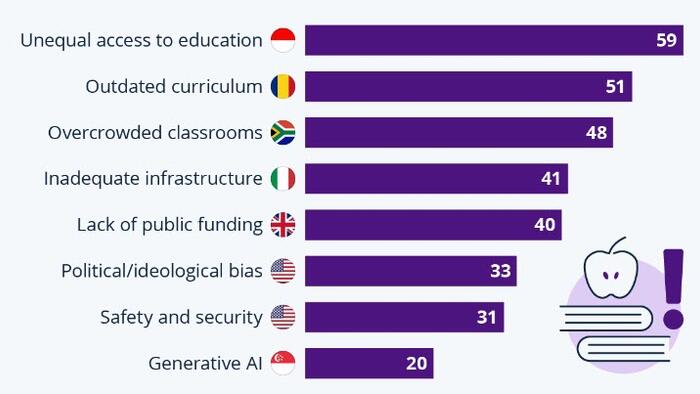A recent Ipsos report examining global attitudes toward education and schools reveals significant disparities in the perception of educational systems across various countries. The survey, conducted between June 21 and July 5, 2024, engaged over 1,000 respondents from 30 different nations. Findings indicate a strong concern in the United States about political and ideological bias within the educational framework, with one-third of respondents identifying it as the foremost challenge. This sentiment is echoed in Hungary and Poland, where 30 percent of adults similarly pointed to political biases as critical issues confronting their education systems.
In the United States, worries about children’s safety emerged as another key concern, with 31 percent of respondents prioritizing this issue. This apprehension over safety in schools was not confined to the U.S.; similar sentiments were recorded in France, where 30 percent expressed concern, and in nations like India, Mexico, and Brazil, at 24 percent each. These statistics highlight a pervasive anxiety regarding school safety that is prevalent across multiple countries, suggesting a global trend in parental concerns about the physical protection of students in educational environments.
Indonesia stands out in the survey with a stark focus on unequal access to education, deemed the most pressing issue by 60 percent of its respondents. This concern is compounded by additional challenges such as inadequate infrastructure, highlighted by 36 percent of participants, and insufficient technology usage, identified by 30 percent. These issues underline the deep-rooted inequalities that exist within Indonesia’s educational landscape, contrasting sharply with the concerns voiced in Western nations, thus illustrating the diverse challenges faced by different countries.
In the UK, the survey revealed financial concerns as paramount, with 40 percent citing a lack of public funding as the most significant issue affecting their education system. This was the largest proportion among the countries surveyed. A similar trend was observed in several South American nations, with respondents in Colombia (37 percent), Chile (36 percent), and Brazil (35 percent) also expressing similar concerns about funding. These findings emphasize a critical need for investment in education to address systemic deficiencies that significantly impact learning outcomes for students.
The report revealed a marked contrast in perceptions of educational effectiveness, particularly in Asia, where respondents generally held more favorable views. A considerable majority in India (72 percent) believe that their education system helps reduce social inequalities, a sentiment echoed in other Asian countries such as Singapore (68 percent), Thailand (66 percent), Indonesia (64 percent), and Malaysia (63 percent). These positive perceptions suggest that, in many Asian societies, education is viewed as a vehicle for social mobility and equity, leading to broader societal benefits. In stark contrast, countries like Turkey (34 percent) and Hungary (30 percent) reflect more skepticism about the transformative potential of education.
Overall, the Ipsos report highlights significant global differences in attitudes toward education, pointing to a wide range of challenges that various nations contend with. From concerns about political bias and safety in the U.S. to issues of funding in the UK and social inequalities in Asia, these insights shed light on the complex and multifaceted nature of education systems worldwide. As countries navigate these challenges, the findings underscore the importance of context-specific reforms and investments to bolster educational outcomes and support equitable access for all students.

